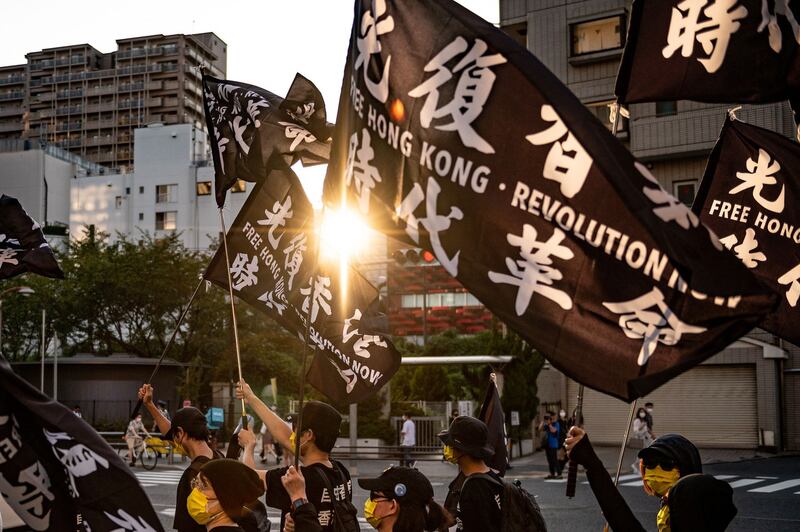Former trade unionists canceled a planned May Day demonstration in Hong Kong after one of the organizers was hauled in by police and forced to withdraw his application for a police permit, with the authorities citing Beijing's national security law.
Joe Wong, who once chaired the now disbanded Hong Kong Confederation of Trade Unions, and former committee member Denny To announced in mid-April that they had applied for police permission to hold a public demonstration, which is required for gatherings of more than 30 people, on Monday.
But police hauled Wong in for five hours' questioning on April 26, during which time he said he had withdrawn his application.
The move comes after police arrested veteran labor unionist Elizabeth Tang outside the Hong Kong prison where her husband and fellow labor activist Lee Cheuk-yan is imprisoned on March 9, on suspicion of "collusion with foreign forces" under the national security law.
Last July, a United Nations human rights council review of Hong Kong's rights record said the process had been hampered by a citywide crackdown on civil society groups, which had disbanded faced with ongoing or potential investigation by state security police, with several of their leaders currently detained awaiting trial on national security charges, and others forced into exile.
It said groups had been deterred from submitting to the review for fear of being accused of "collusion with foreign powers" under the national security law, which ushered in a citywide crackdown on public dissent and peaceful opposition that has seen dozens of former opposition lawmakers and pro-democracy activists stand trial for "subversion" for holding a primary election.
‘Emotionally broken’
To said in a statement also published on April 26 that Wong was "emotionally broken," and had refused to discuss details of his conversations with police, citing Article 63 of the national security law, which was imposed by the ruling Chinese Communist Party on the city in the wake of the 2019 protest movement.
"He wasn't arrested but was emotionally broken and apparently under great pressure," To wrote via the planned event's Facebook page. "He told me that he had just signed a paper to cancel the application for a march, but was limited by Article 63 of the National Security Law for Hong Kong, and couldn't disclose details."
"Wong has done everything in his power to defend the right to hold demonstrations, and I fully understand and support his decision," To wrote. "Social movements shouldn't expect people to be saints, because no-one is."
"The key thing is not to capitulate in advance," he wrote, amid an ongoing crackdown on public dissent and peaceful political opposition under the national security law.

Chan Po-ying, who heads the pro-democracy League of Social Democrats, was herself warned by police to ensure her petition "complies with the national security law" as she led a smaller group of party members to petition the government on Monday, in lieu of a demonstration.
"May 1 should be about workers' dignity, and yet police have forced the organizers to withdraw their application for a march, using false pretexts," Chan said. "The police should help to maintain order, not suppress our rights with excuses."
She said the cancellation had little to do with policing challenges or crowd control, citing a large public gathering marking the birthday of Hong Kong boy-band star Keung To on Sunday.
"A thousand people celebrated Keung To’s birthday in Causeway Bay yesterday," Chan said. "The police were able to help maintain order, and no incidents occurred. So why are the police creating fear ... to prevent a march on May 1?"
Clamping down
Organizers have canceled a slew of planned marches and demonstrations since Hong Kong lifted a ban on public gatherings earlier this year, with Chinese officials making vague warnings that demonstrations are vulnerable to being "hijacked by others," an oblique reference to its claim that recent pro-democracy movements in Hong Kong were the work of "hostile foreign forces" trying to foment a revolution in the city.
Last month, police forced participants in the first public protest to go ahead since the lifting of COVID-19 restrictions to register with their real names, wear numbered badges and walk within a police cordon.
Chan said the Labor Day march was once an annual fixture for the Hong Kong labor movement on both sides of the political spectrum.
"In the past, the pro-Beijing groups like the Federation of Trade Unions would march in the morning, and the independent Confederation of Trade Unions in the afternoon," Chan said. "It made for a very lively day, with labor issues constantly being raised."
"The demonstration was a very important way for workers to demonstrate their strength, and it's hard to see how their demands are being taken seriously now by the government," she said, adding that the Legislative Council only gives a platform to employers, not to unions, following changes to electoral rules barring pro-democracy candidates from running for the legislature.
Figures supplied by the government to a question from lawmakers showed a sharp fall in newly registered trade unions in recent years, since the national security law took effect in July 2020, falling from 495 in 2020 to just 40 in 2022.
But Chan said the labor movement isn't over yet.
"Until all labor issues in Hong Kong are resolved, trade unions will be needed, and their voices will need to be heard," she said.
Lam Chun-sing, who chairs the pro-Beijing Federation of Hong Kong and Kowloon Labour Unions, said his union had also withdrawn its application to stage a 200-person march, citing police "advice."
"We hope to find a balance between ensuring a safe environment and allowing workers to express their demands," Lam said. "In cases where there aren't too many security considerations, or the chances of a march being hijacked are small, it could be beneficial in some cases to encourage worker participation."
Translated by Luisetta Mudie. Edited by Malcolm Foster.
